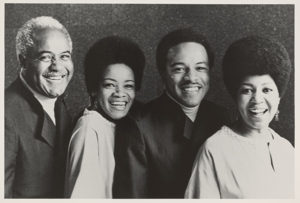By Harvey Kubernik Copyright 2020
Craft Recordings is thrilled to announce a deluxe CD edition of Come Go With Me: The Stax Collection scheduled for a November 13th retail release.
The acclaimed box set, which was previously released on vinyl digital formats, celebrates one of music’s greatest gospel and soul groups, The Staple Singers.
Come Go With Me presents all of the group’s studio albums released on the iconic Memphis label, spanning 1968–1974, and features the Staples’ biggest hits, including “I’ll Take You There,” “Respect Yourself” and “If You’re Ready (Come Go with Me).”
Each album was remastered from the original analog masters by Jeff Powell at Take Out Vinyl, while the seventh disc offers rarities, non-album singles and live recordings from the legendary 1972 Wattstax music festival. Housed in a slipcase, the seven-disc collection also includes a booklet with archival photos and liner notes from American music specialist and curator Levon Williams (formerly of the Stax Museum and the National Museum of African American Music), and folklorist, ethnomusicologist and writer Dr. Langston Wilkins.
Released on vinyl and digital platforms earlier this year (in February), Come Go With Me: The Stax Collection received strong praise from such outlets as Uncut, Mojo and Paste, the latter of which wrote, “this marvelous run of records sound brand new in these new all-analog pressings, with the earthy tang of the Muscle Shoals Rhythm Section and the Bar-Kays horn section ripping out of the speakers with hip-shaking fervor… This is a milestone of American musical history, treated with the appropriate levels of respect and reverence.”
All six of the Staple Singers’ albums with Stax were also made available in hi-res 24-bit/192 kHz and 24-bit/96 kHz formats for the first time.
Roebuck “Pops” Staples and his three singing daughters – Mavis, Yvonne, and Cleo-have come a long way from the main part of Mississippi. From their gospel beginnings through the folk-rock era to their soul music peak, the Staple Singers have traveled a long, artistically-rich road into the mainstream of American music.
Roebuck Staples was born in 1915 in Winona, Mississippi, where he grew up with hard times and the blues, his singing and guitar style influenced by country bluesmen Barbecue Bob and Big Bill Broonzy. But Roebuck found the Lord and joined a jubilee quartet called the Golden Trumpets.
Roebuck, his wife Oceola, and their two children, Cleotha and Pervis, moved north to Chicago in 1936, where Yvonne and Mavis were born a few years later. Singing in a Southern quartet style usually performed by all-male, adult groups, the Staple Singers began appearing at local churches in 1948. Mavis, then age seven, handled the bass parts.
By 1954, Pops, Mavis, Cleo, and Pervis (Yvonne replaced him many years later) landed a contract with Chicago’s United label, cutting a number called “Sit Down Servant.” Pop’s thin, winsome tenor shared the lead with Mavis’s deep, throaty tones, as they have done ever since, although her unique contralto had not developed the emotional edge it was soon to have. The record failed to catch on, though, perhaps because Pops’ reverberating down-home guitar, which would become an-other trademark of their style, was overshadowed by a rinky-tink piano.
The Staple sound did click in a big way when their haunting 1957 Vee-Jay recording of “Uncloudy Day” became a nationwide gospel hit. Others followed, including “Will the Circle Be Unbroken,” “Help Me, Jesus,” and “Swing Down Chariot (Let Me Ride”), established the Staples as one of America’s top gospel attractions.
They were signed to Bill Grauer and Orrin Keepnews’s Riverside jazz label in 1962 when the folk music boom was in full force. The group was beginning to pick up college bookings, in addition to their religious dates. While at Riverside, they were the first black artists to record material by Bob Dylan.
Their Vee-Jay catalog appealed to English musicians as well. “The Last Time,” a 1964 session from the Rolling Stones produced by Andrew Loog Oldham at RCA studios in Hollywood implements a refrain very similar to “This May Be the Last Time,” a 1958 recording by the Staples Singers.
Their following continued to expand when they moved to the Epic label, where they became identified with social protest songs like “Freedom Highway” and “Why? (Am I Treated So Bad),” both penned by Pops, and Stephen Stills’s “For What It’s Worth.” (The latter two were produced by rock and roll legend Larry Williams.)
When the Staples joined Stax in 1968, they were working alongside major rock acts at places like the Fillmore West and East. The first two Stax albums, produced by Steve Cropper, continued in the folk vein.
The Staples Singers third Stax LP, The Staple Swingers, offered a bold new direction of hip soul “message” songs. It was produced in Muscle Shoals, Alabama, by Al Bell, as was their next, Be Altitude: Respect Your-self.
Be Altitude broke the Staple Singers wide open. “Respect Yourself,” written by Mack Rice and Luther Ingram, reached the Number Two position on Billboard’s soul chart, while Al Bell’s “I’ll Take You There,” with its infectious reggae-like beat, hit Number One soul and pop.
More hits followed at Stax-“Oh La De Da,” “If You’re Ready (Come Go with Me),” and “Touch a Hand, Make a Friend”-before they moved on to Warner Bros., where they scored with Curtis Mayfield’s soundtrack to the 1975 comedy Let’s Do It Again which starred Sidney Poitier, Bill Cosby and Jimmie Walker.
Changing their name to “The Staples” and adopting a more secular image, the group cut albums produced by fellow Chicagoans Curtis Mayfield and Eugene Record.
Pops Staples died December 19, 2000.
Come Go With Me: The Stax Collection documents a period after the time that the Staple Singers signed to Stax in 1968, they had long graduated from the gospel circuit. The Chicago group had become well known in the counterculture and folk scenes and were performing alongside major rock acts like Big Brother and the Holding Company and the Grateful Dead. The Staples had also become formidable voices in the Civil Rights movement, and many of their songs preached a message of empowerment and racial equality.
In the fall of ’68, the group went into the studio to record their first album for Stax, Soul Folk in Action, working with producer Steve Cropper and songwriter Homer Banks. The sessions were set against a backdrop of social and political turmoil, which climaxed with the assassination of Dr. Martin Luther King, Jr. in Memphis. The Staple Singers were known for writing politically charged “message songs,” and the year’s events certainly inspired many of the tracks on this album, including “Long Walk to D.C.” and “The Ghetto.”
In their liner notes to 2020’s Come Go With Me: The Stax Collection, Levon Williams and Langston Wilkins write that both of these songs “Truly tapped into the experiences and emotions of Black America at the close of the ’60s. The former is a tribute to the 1963 March on Washington told from the perspective of a poor yet hopeful African American person willing to use their last dimes to make it to the rally … Conversely, the somber and haunting ‘The Ghetto’ takes listeners deep into the isolation and despair of inner-city life.”
Also notable to this album are covers of The Band’s “The Weight” and Otis Redding’s “(Sittin’ On) The Dock of the Bay,” recorded in tribute to the fallen Stax star, who died tragically just a year earlier in a plane crash. The Staple Singers returned to the studio with Cropper the following year to record We’ll Get Over (1970). Highlights include the standout message song “When Will We Be Paid,” as well as covers of tracks like Sly & the Family Stone’s “Everyday People” and Gladys Knight & the Pips’ “The End of the Road.”
I was present for some 1975 recording dates Steve Cropper was producing on Rod Stewart for his Atlantic Crossing LP in Hollywood at the legendary Cherokee Studios.
One late evening I cited a favorite tune of mine, “Water,” which Steve cut with Pops Staples and Albert King. Cropper gave me the origin of the composition and a tutorial about the guitar style of Pops Staples.
Though both Soul Folk in Action and We’ll Get Over carried powerful messages and tight-knit harmonies, neither had commercial success. And so, for the band’s third album, Stax co-president Al Bell (who signed the band) took the helm as producer.
Williams and Wilkins note that “As a long-time DJ, Bell’s ear for what moves black listeners, both literally and metaphorically, had been keenly crafted over several years. Bell hosted shows that had both sacred and secular followings and had amassed a wealth of experience from watching, noting and deeply understanding the impact music has on varied audiences. His ear was essentially priceless.”
With support from the Muscle Shoals Rhythm Section (also known as “The Swampers”), the Staple Singers found a winning team with Bell, and the resulting album, 1971’s The Staple Swingers, would be their first charting record, peaking at No. 9 on Billboard’s top R&B albums. The LP offered a funkier sound from the group, with high-energy singles like “Heavy Makes You Happy (Sha-Na-Boom Boom)” and the Smokey Robinson cover “You’ve Got to Earn It.”
The group reunited with the Swampers and Bell for 1972’s Be Altitude: Respect Yourself, an album that transformed the Staple Singers into mainstream stars. Peaking at No. 19 on the Billboard 200, the groove-filled album featured the Staples’ first No. 1 hit—the infectious “I’ll Take You There,” and “Respect Yourself,” a song which Williams and Wilkins declare “encapsulates the Staple Singers’ entire career.” The powerful message song not only resonated with African Americans but also with many women across the country as they, too, fought for equal opportunity.
The group’s 1973 follow-up, Be What You Are, featured the Top Ten hit “If You’re Ready (Come Go With Me),” popular single “Touch a Hand, Make a Friend” and the sweetly harmonized “Love Comes in All Colors,” while the Staple Singers’ final album with Stax—1974’s City in the Sky—includes such highlights as the politically charged “Washington We’re Watching You,” “Back Road into Town” and “Who Made the Man,” which marked a return to the group’s gospel roots.
The final disc in Come Go With Me: The Stax Collection offers a selection of live tracks from the Staple Singers’ energetic 1972 Los Angeles Coliseum performance at Wattstax, as well as B-sides like “Stay With Us,” non-album singles like “Oh La De Da” and rarities that include “Walking in Water Over Our Head” and “Trippin’ on Your Love.”
Following their time at Stax, the Staple Singers continued to tour and record throughout the ’70s and early ’80s. They were inducted into the Rock & Roll Hall of Fame in 1999 and received a GRAMMY® Lifetime Achievement Award in 2005.
In recent years, Mavis Staples has been back in the spotlight—headlining tours and reaching a new generation of fans with her solo records. In 2016, she was the subject of a documentary (Mavis!) and ended the year as a Kennedy Center Honoree.
One of the most popular soul labels of all time, Stax has become synonymous with its gritty, Southern sounds. Originally known as Satellite Records, the Memphis imprint was founded in 1957 by Jim Stewart. Over the course of two decades, Stax released more than 800 singles and nearly 300 LPs, picking up eight GRAMMYS® and an Academy Award along the way. In all, Stax placed more than 167 hit songs in the Top 100 pop charts and a staggering 243 hits in the Top 100 R&B charts.
Morgan Neville is an Academy Award, Grammy Award and Emmy Award-winning director known for his work as a cultural documentarian.
His acclaimed film 20 Feet From Stardom won the 2014 Academy Award for Best Documentary as well as a Grammy Award for Best Music Film.
For over twenty five years Neville has been directing, writing and producing films about music and cultural subjects including Troubadours, Search and Destroy and three Grammy-nominated films: Respect Yourself: The Stax Records Story, Muddy Waters Can’t Be Satisfied, and Johnny Cash’s America.
I interviewed him in 2020 for my book Docs That Rock, Music That Matters. In our dialogue Morgan discussed the monumental Stax label and his terrific documentary Respect Yourself: The Stax Records Story.
“Stax Records was about opening a studio in South Memphis and letting the kids in the neighborhood like David Porter, Isaac Hayes and Booker T. Jones come in and make music,” Neville explained.
“The moment where somebody created a moment and situation where young people could come and do the best creative work they were capable of. They were challenged and they rose to that challenge. Just a great story of these people who ended up writing music that scored a popular culture for many years. But it’s such an unlikely story.
“I really think Stax is one of the rare stories where the music is as amazing as the story. Everything about Stax is a big story with big characters. And, it’s about race in America the sixties and seventies. But the music is fucking good!
“Stax was like the great untold story of popular music in the south to my mind. It had all the elements. It was like a Greek tragedy with an amazing soundtrack. It took a couple of years to get that film made.”
To learn more about the Stax record label and the Staple Singers visit StaxRecords.com.
(Harvey Kubernik is the author of 19 books, including Canyon Of Dreams: The Magic And The Music Of Laurel Canyon and Turn Up The Radio! Rock, Pop and Roll In Los Angeles 1956-1972. Sterling/Barnes and Noble in 2018 published Harvey and Kenneth Kubernik’s The Story Of The Band: From Big Pink To The Last Waltz. For 2021 they are writing a multi-narrative book on Jimi Hendrix for the same publisher.
Otherworld Cottage Industries in July 2020 has just published Harvey’s 508-page book, Docs That Rock, Music That Matters, featuring Kubernik interviews with D.A. Pennebaker, Albert Maysles, Murray Lerner, Morgan Neville, Sandra Warren, Michael Lindsay-Hogg, Andrew Loog Oldham, John Ridley, Curtis Hanson, Dick Clark, Travis Pike, Allan Arkush, and David Leaf, among others.
In 2020 Harvey served as Consultant on Laurel Canyon: A Place In Time documentary directed by Alison Ellwood which debuted on May 2020 on the EPIX/MGM television channel.
Kubernik served as Consulting Producer on the 2010 singer-songwriter documentary, Troubadours directed by Morgan Neville. The film screened at the 2011 Sundance Film Festival in the documentary category. PBS-TV broadcast the movie in their American Masters series. During 2020 Kubernik is working on an authorized documentary on singer/songwriter Del Shannon.
His writings are in several book anthologies, most notably The Rolling Stone Book Of The Beats and Drinking With Bukowski. He was the project coordinator of the recording set The Jack Kerouac Collection. Kubernik’s 1995 interview, Berry Gordy: A Conversation With Mr. Motown appears in The Pop, Rock & Soul Reader edited by David Brackett published in 2019 by Oxford University Press. Brackett is a Professor of Musicology in the Schulich School of Music at McGill University in Canada. Harvey joined a distinguished lineup which includes LeRoi Jones, Johnny Otis, Ellen Willis, Nat Hentoff, Jerry Wexler, Jim Delehant, Ralph J Gleason, Greil Marcus, and Cameron Crowe. Kubernik’s 1996 interview with poet/author Allen Ginsberg was published in Conversations With Allen Ginsberg, edited by David Stephen Calonne for the University Press of Mississippi in their 2019 Literary Conversations Series.
Harvey Kubernik penned a back cover book jacket endorsement for author Michael Posner’s book on Leonard Cohen that Simon & Schuster, Canada, will be publishing October 2020, Leonard Cohen, Untold Stories: The Early Years).








